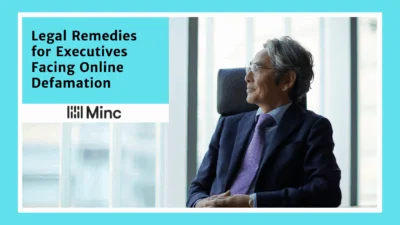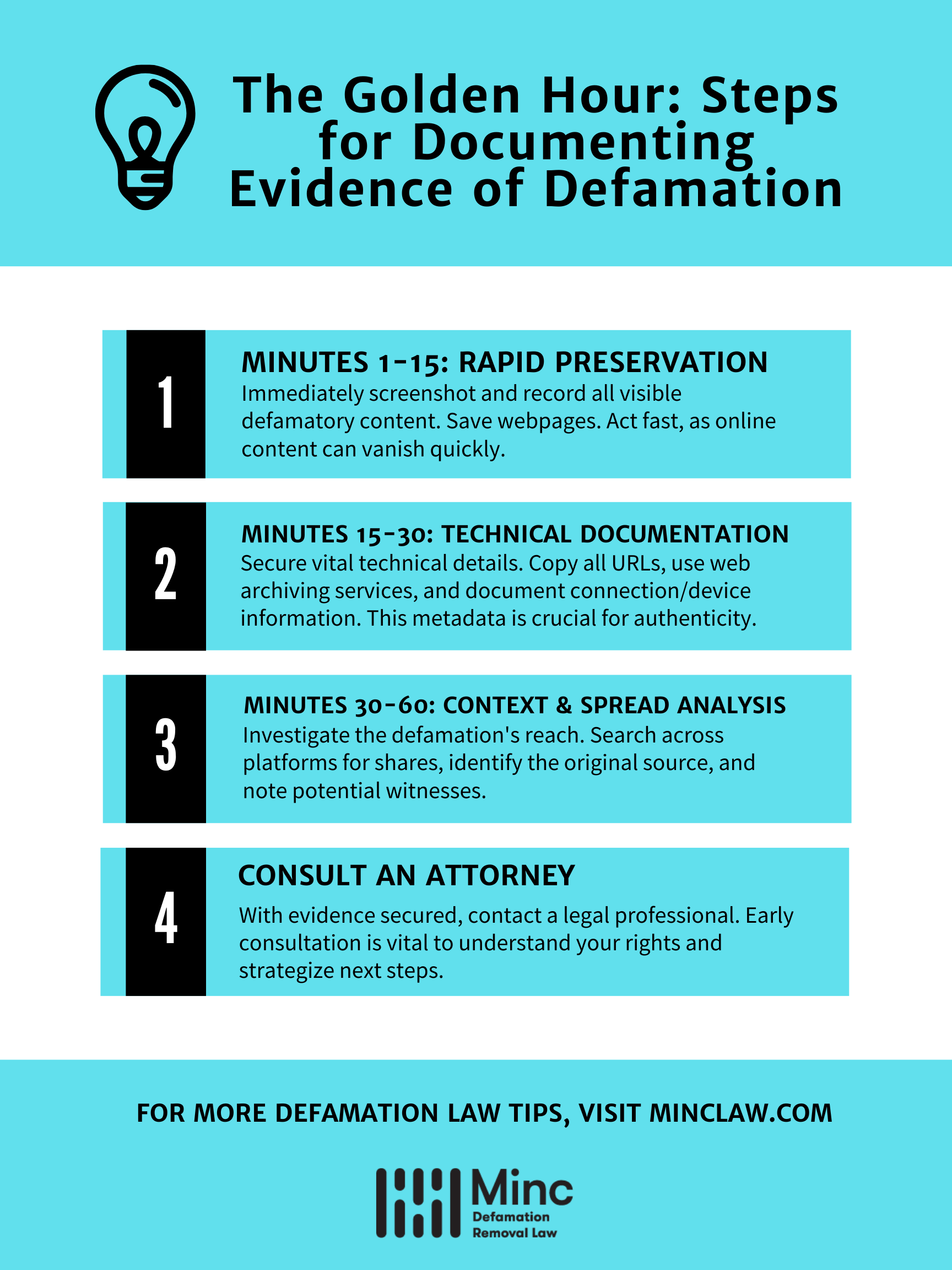
- Originally Published on August 26, 2025
Legal Remedies for Executives Facing Online Defamation
For an executive, reputation is inextricably linked to leadership. It shapes how investors trust you, how employees follow you, and how the public perceives your company. A false accusation posted online, whether in a niche blog, a viral tweet, or a major news outlet, can immediately erode confidence in your ability to lead. The higher your visibility, the more vulnerable you are. An executive’s career can be undone not only by proven misconduct, but also by an unverified claim that takes on a life of its own in search results or the media cycle.
Online defamation is uniquely damaging because of its speed and permanence. Defamatory content online can be shared thousands of times in minutes, cached by search engines, and indexed in a way that resurfaces it for years to come. This creates a reputational shadow that affects contract negotiations, investor meetings, hiring opportunities, and even personal relationships. For executives, the question is not whether reputational threats will appear, but how prepared they are to respond when they do.
You have clear legal rights and proven strategies to protect your reputation. At Minc Law, we focus exclusively on internet defamation, online harassment, and digital reputation matters, and we have helped more than 3,500 clients take back control from false and damaging online attacks. If you are an executive facing harmful allegations, know that you do not need to face this situation alone. With the right legal guidance, you can stop defamatory content, restore trust, and move forward with confidence.
Understanding Online Defamation in the C-Suite
Defamation generally requires four elements: a false statement of fact, publication to a third party, fault amounting to at least negligence, and resulting harm to reputation. The digital environment multiplies opportunities for all four to be met. A frustrated employee can post an anonymous review alleging misconduct. A competitor might spread misleading claims in an industry forum. A journalist may publish a rushed article that repeats allegations without proper verification. Each of these scenarios satisfies the threshold of publication and fault, and each has the potential to cause lasting harm when the statement is false and damaging.
What complicates matters is the blending of fact, opinion, and insinuation online. A scathing review that says “this CEO is corrupt” may appear to be opinion, but it can cross into defamation if it implies factual corruption. Similarly, headlines designed to attract clicks often make sharper accusations than the underlying facts support. For executives, the nuance is less important than the impact. A single sentence can set off waves of doubt that ripple through shareholders, clients, and the media.
Why Executives Become Targets
Executives face increased exposure for several reasons:
- Visibility: Leaders are under constant scrutiny because their decisions affect large groups of stakeholders.
- Disgruntled employees: Former or current staff may vent frustrations online in ways that are false or misleading.
- Competitors: Rivals may use reputational attacks to create business advantages.
- Critics and activists: Advocacy groups may target corporate decisions and frame them as executive failings.
- Anonymous users: Trolls and anonymous posters often spread damaging rumors for attention.
Allegations against executives frequently involve severe accusations such as fraud, harassment, or discrimination. Even if entirely false, these claims strike at credibility, which is the foundation of executive authority.
The First Moves Matter Most When Facing Online Defamation
When defamatory content appears, the instinct is often to fight back immediately, perhaps even to respond publicly in anger. This is usually a mistake. Quick, emotional reactions can amplify the content, draw more attention to it, and make it harder to contain. The first priority should be preservation: saving screenshots, recording URLs, and noting publication dates. This evidence can vanish quickly as platforms remove posts or attackers delete them, but once lost, it becomes much harder to pursue legal remedies.
Next comes assessment. Not all defamatory content has the same weight. A post on a little-read forum may not warrant the same urgency as an article indexed on Google News. The executive, together with experienced counsel, should evaluate the scope of exposure, the credibility of the source, and the potential for damage. This measured approach is difficult in moments of stress but critical to ensuring that the response is proportionate and effective.
Finally, professionals should be involved early. Executives rarely have the luxury of trial and error. Consulting with an attorney experienced in defamation law ensures that the next step, whether a takedown notice, a retraction request, or litigation, is strategically chosen rather than emotionally driven. In some cases, public relations advisors may also need to be consulted immediately, particularly if media coverage is involved. The difference between a fleeting rumor and a reputational crisis often hinges on whether the right people were involved in the first 24 hours.

Legal Remedies Available
The law offers executives several tools to combat online defamation. At the most basic level is the cease and desist letter, a formal demand that the defamatory statements be removed and not repeated. While not legally binding in itself, such a letter often carries significant weight, particularly when backed by evidence and the reputation of a law firm that regularly handles defamation matters.
Another option is requesting a retraction or correction. Many reputable publications will amend or remove content if presented with proof of inaccuracies. These requests must be carefully worded and supported by documentation, as they become part of the paper trail of the dispute.
If the defamation appears on platforms like LinkedIn, Twitter, or Google reviews, executives can also use platform reporting mechanisms. While success varies, a report supported by legal arguments and evidence has a higher chance of being taken seriously than one submitted without legal backing.
In cases where the defamer hides behind anonymity, the law allows for John Doe lawsuits. These cases enable courts to subpoena platforms and internet service providers to unmask the attacker. Once identified, the defamer can be pursued for damages or forced to retract their statements.
Finally, when the stakes are high, litigation becomes unavoidable. A defamation lawsuit allows for recovery of damages and, more importantly, court orders requiring removal of false statements. Litigation is not always the first or best step, but for executives falsely accused of serious misconduct, it can be the only way to achieve full vindication.
Balancing Legal Action With Strategy
Litigation is not always the best first step. Lawsuits can be lengthy, costly, and public, sometimes amplifying the very content an executive wishes to suppress. Quiet solutions such as negotiated corrections or takedowns may provide faster and less disruptive relief.
When considering litigation, executives and their legal teams should weigh:
- The strength of the legal claim.
- The likely response of the defamer.
- The reputational consequences of public proceedings.
Strategic evaluation ensures that the chosen path addresses the problem without creating unnecessary risk.
The Role of Reputation Management
Legal remedies address the immediate harm, but executives also need to think about the long game. A single defamatory post may be removed, but what if another arises? What if media outlets amplify the original claim? This is where reputation management becomes essential.
Executives should cultivate strong online presences before a crisis occurs. Publishing thought leadership pieces, participating in interviews, and maintaining active professional profiles create a reservoir of positive content that can outweigh defamatory material. When search engines rank results, having multiple credible pages associated with your name helps push down negative or false items.
Monitoring is equally important. Services that scan the web for mentions of your name allow you to detect problems early, when they are easier to resolve. Without monitoring, defamatory posts can remain unnoticed until they have spread too widely to contain easily.
Finally, a crisis communication plan ensures that if a major reputational threat emerges, the response is not improvised. Identifying who will speak publicly, what the messaging will be, and how stakeholders will be reassured in advance makes the difference between a coordinated defense and a disorganized scramble.
Unique Challenges for Executives
Executives face reputational challenges that go beyond what most professionals encounter. Investor relations can be directly affected by allegations, even if unproven. Boards of directors may feel compelled to act quickly, sometimes prioritizing optics over fairness. Media outlets that cover corporate leadership often report on rumors simply because they involve high-profile figures, creating amplification that ordinary individuals rarely face.
Additionally, executives may operate across jurisdictions, with reputational threats originating in one state or even another country. This complicates legal remedies, as defamation laws vary widely. A statement that is defamatory in one jurisdiction may be protected speech in another. For executives with global roles, cross-border strategy is often required.
These challenges highlight the need for tailored responses. What works for a small business owner may not suffice for a Fortune 500 executive. The stakes are higher, the scrutiny is greater, and the solutions must be both legal and strategic.
Protecting What You Have Built
For an executive, reputation is not simply personal pride. It is the foundation of leadership, the currency of trust, and the lifeblood of professional influence. Online defamation poses a threat to all of these in ways that are fast-moving and deeply disruptive. But executives are not powerless.
Minc Law has helped executives across industries confront defamation directly, remove harmful content, and restore their reputations. If your name or your company is under attack, you do not have to face it alone. By combining legal experience with strategic foresight, you can protect not only your reputation but also the future you have worked to build.
Do not wait for false statements to define your legacy. Contact Minc Law for a confidential consultation and take the first step toward stopping online defamation, removing harmful content, and restoring peace of mind.
Get Your Free Case Review
Fill out the form below, and our team will review your information to discuss the best options for your situation.
This page has been peer-reviewed, fact-checked, and edited by qualified attorneys to ensure substantive accuracy and coverage.



